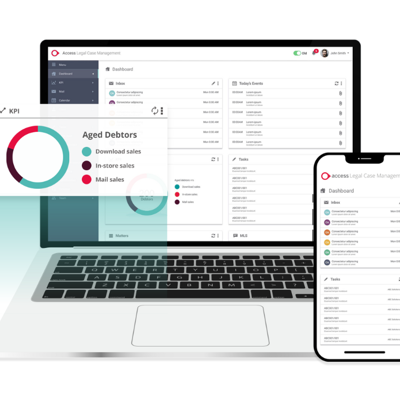Law Firms Digital Transformation
Accelerate to the future
To satisfy the needs of today's tech-savvy clientele, a legal firm's digital transformation is a deliberate process that incorporates people, procedures, and technology.
Embracing the latest digital solutions you can stay ahead of the competition and ensure that your firm remains competitive, efficient and profitable in the ever-evolving legal landscape.

Transforming on the go!
Even the most digitally advanced law firms are just beginning their transformation journey. Right now, law firms are looking over to other sectors and realising the need to pick up the pace. With our comprehensive legal solutions and guidance suite, you can start and stay ahead of the curve.
71% of law firms are prioritising remote interaction over in-person (*Legal Trends Report 2021)
Watch Webinars On Demand

Managing your team remotely
See how you can manage your team while working working remotely, keeping track of workloads and performance.

Digital Transformation - Your firm and your people
With most of the top 50 law firms looking to reduce their office footprint by around 11-20% and move towards software solutions such as case management, digital transformation is a must.

Create great client outcomes, enhance their productivity and ensure continuity of their business today
Whitepapers

What can law firms learn from consumer-centric sectors?
We have a new paper for law firms that looks specifically at the consumerisation of the legal sector which has been happening for some time now. Driven by growing competition in the market, and changing client behaviour and expectations has meant a complete change in focus for the majority of the people you are targeting with your services.

Connect your data and differentiate your law firm
Many legal firms have been collecting data from across the business for years – but there’s now a clear appetite to bring it together in one place, join the dots and make sense of it easily.
They share our vision for a connected data-rich environment that brings together case and practice management, HR, CRM and finance systems.
Supporting all areas of law with powerful workflows and over 100 best in class integrations
- Accident management software
- Commercial legal software
- Conveyancing software
- Criminal law software
- Debt recovery software
- Employment law software
- Family law software
- Financial claims software
- Legal client portal software
- Legal cost drafting software
- Mediation software
- Medical case management software
- Personal injury software
- Power of attorney software
- Wills and probate software
Our Useful Resources

How much does legal software cost?
There is a wide range of pricing models out there when it comes to choosing your new legal software.
We break down these options and look under the bonnet of what law firms should expect in terms of pricing for legal case and practice management software.

How to select the right legal software for large law firms?
The legal industry in the United Kingdom has become increasingly competitive in recent years, with law firms of all sizes vying for clients and market share. To stay competitive, law firms must use the latest legal technology, including legal software that helps them manage their cases, streamline their operations, and deliver exceptional client service. But how do large law firms pick the legal software that is best for them? This article will explore the key factors that large law firms should consider when choosing the right solution.

Top benefits of integrating your practice management and document management systems
Integrating your legal practice management software and document management systems can offer a wide range of benefits to your business, including increased efficiency, improved organization, and enhanced security. In this blog post, we will explore the top benefits of integrating these two systems and how they can help your business thrive.

Why digital transformation is essential for law firms of all sizes
We can’t escape it; digital transformation is here to stay, and it’s not just for large multinational law firms but for all sizes and types of law firms.
The term digital transformation refers to the process of using digital technologies to transform and modernise traditional business operations, cultures and customer experiences. In the context of law firms, this means leveraging technology to improve efficiency and expand their services as they strive to stay competitive in an increasingly digital world.

How long would it take for a law firm to go paperless?
It is estimated to take anywhere from between 6 and 18 months for a law firm to become paperless, if they are serious about doing so. A medium-sized law firm with the right approach could be almost entirely paperless within a 6-month period, depending on the size and complexity of the Practice. A small firm should definitely be able to achieve it sooner. Whilst at the other end of the scale a very large, long-established firm with many traditional paper-based processes still in place, could easily take up to 18 months to become completely independent of paper.

How long does it take to implement new law firm software?
For a new start-up law firm, with a handful users it can be relatively quick to get up and running with a new suite of software. It could be anywhere between 6 weeks and 6 months depending on many factors. For example, for a new firm with say up to 5 users, it could be six weeks or less from placing the order to go-live. This would include the training of staff, for a straight-forward legal accounts software implementation. However, for larger firms, with several branches, and more complex needs – it can take a while longer.

Is fully integrated software for law firms better than separate software packages?
Every law firm is different, each with its own unique characteristics. A law firm that practises several areas of law, manages complex cases and has sophisticated fee earner needs is probably better with a fully integrated suite of practice management software. Especially for its staple software modules such as legal accounts, case management software, time recording and CRM (client relationship management). The more straight-forward law firm, specialising in just one niche area of law perhaps, may be fine with separate applications.


